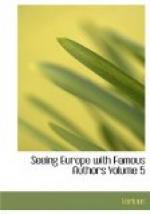From Thurmchen to Bayenthurme, the town, which extends upward of a league on the banks of the river, displays a whole host of windows and facades. In the midst of roofs, turrets and gables, the summits of twenty-four churches strike the eye, all of different styles, and each church, from its grandeur, worthy of the name of cathedral. If we examine the town in detail, all is stir, all is life. The bridge is crowded with passengers and carriages; the river is covered with sails. Here and there clumps of trees caress, as it were, the houses blackened by time; and the old stone hotels of the fifteenth century, with their long frieze of sculptured flowers, fruit and leaves, upon which the dove, when tired, rests itself, relieve the monotony of the slate roofs and brick fronts which surround them.
Round this great town—mercantile from its industry, military from its position, marine from its river—is a vast plain that borders Germany, which the Rhine crosses at different places, and is crowned on the northeast by historic eminences—that wonderful nest of legends and traditions, called the “Seven Mountains.” Thus Holland and its commerce, Germany and its poetry—like the two great aspects of the human mind, the positive and the ideal—shed their light upon the horizon of Cologne; a city of business and of meditation.
After descending from the belfry, I stopt in the yard before a handsome porch of the Renaissance, the second story of which is formed of a series of small triumphal arches, with inscriptions. The first is dedicated to Caesar; the second to Augustus; the third to Agrippa, the founder of Cologne; the fourth to Constantine, the Christian emperor; the fifth to Justinian, the great legislator; and the sixth to Maximilian. Upon the facade, the poetic sculpture has chased three bas-reliefs, representing the three lion-combatants, Milo of Crotona, Pepin-le-Bref, and Daniel. At the two extremities he has placed Milo of Crotona, attacking the lions by strength of body; and Daniel subduing the lions by the power of mind. Between these is Pepin-le-Bref, conquering his ferocious antagonist with that mixture of moral and physical strength which distinguishes the soldier. Between pure strength and pure thought, is courage; between the athlete and the prophet—the hero.
Pepin, sword in hand, has plunged his left arm, which is enveloped in his mantle, into the mouth of the lion; the animal stands, with extended claws, in that attitude which in heraldry represents the lion rampant. Pepin attacks it bravely and vanquishes. Daniel is standing motionless, his arms by his side, and his eyes lifted up to Heaven, the lions lovingly rolling at his feet. As for Milo of Crotona, he defends himself against the lion, which is in the act of devouring him. His blind presumption has put too much faith in muscle, in corporeal strength. These three bas-reliefs contain a world of meaning; the last produces a powerful effect. It is Nature avenging herself on the man whose only faith is in brute force....




